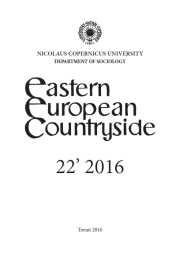Šimon, Martin, Bernard, Josef. 2016. „Rural Idyll Without Rural Sociology? Changing Features, Functions and Research of the Czech Countryside“. Eastern European Countryside. 22 (1): 53-68. ISSN 1232–8855. [cit. 31.08.1016]
The development of the Czech countryside differs in many ways from trajectories typical for Eastern and Central European rural areas in the last 25 years. In our article, we discuss the nature of the ‘Czech exceptionalism’, with reference to three examples, namely population development, the dynamics of rural/agricultural labour markets and rural governance. Firstly, we describe the major driving forces behind rural development in Czechia over the past 25 years and how these forces are reflected in the academic discourse. Secondly, we argue that an important feature of rural regions in Czechia is their population growth combined with a rapid labour market transformation and a low social importance of agriculture. All these changes are interpreted as a shift towards multifunctionality of rural areas rather than as a general trend towards post-productivism indeed, this is because large parts of rural areas remain economically based on industrial production. The ongoing transformations have been reflected only partially in an academic discourse. In conclusion, we argue that there is a need to re-examine the use of EEC as a concept framing the position of sociology in rural research.
Department
Topics
City and Village, Migration and Mobility, Regions, Social Inequalities, Sociological Theory, Public Administration
